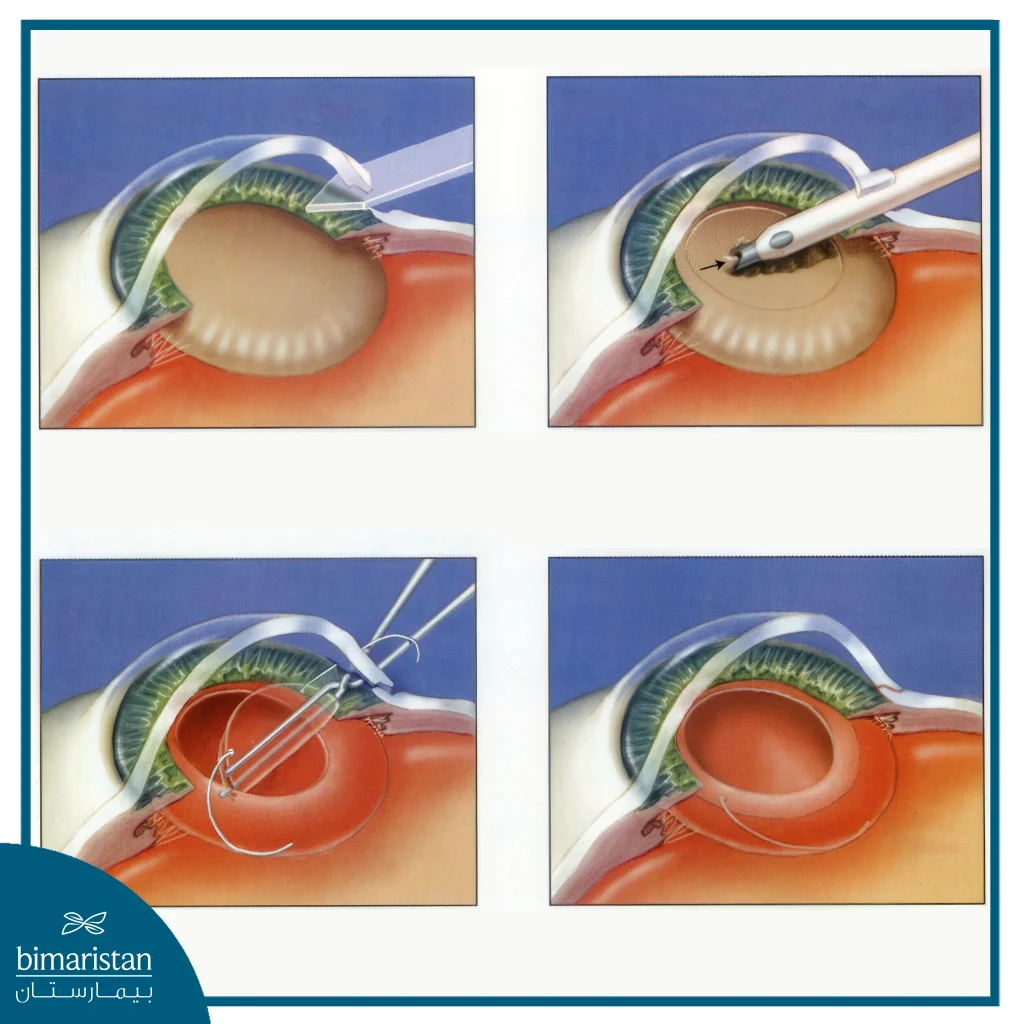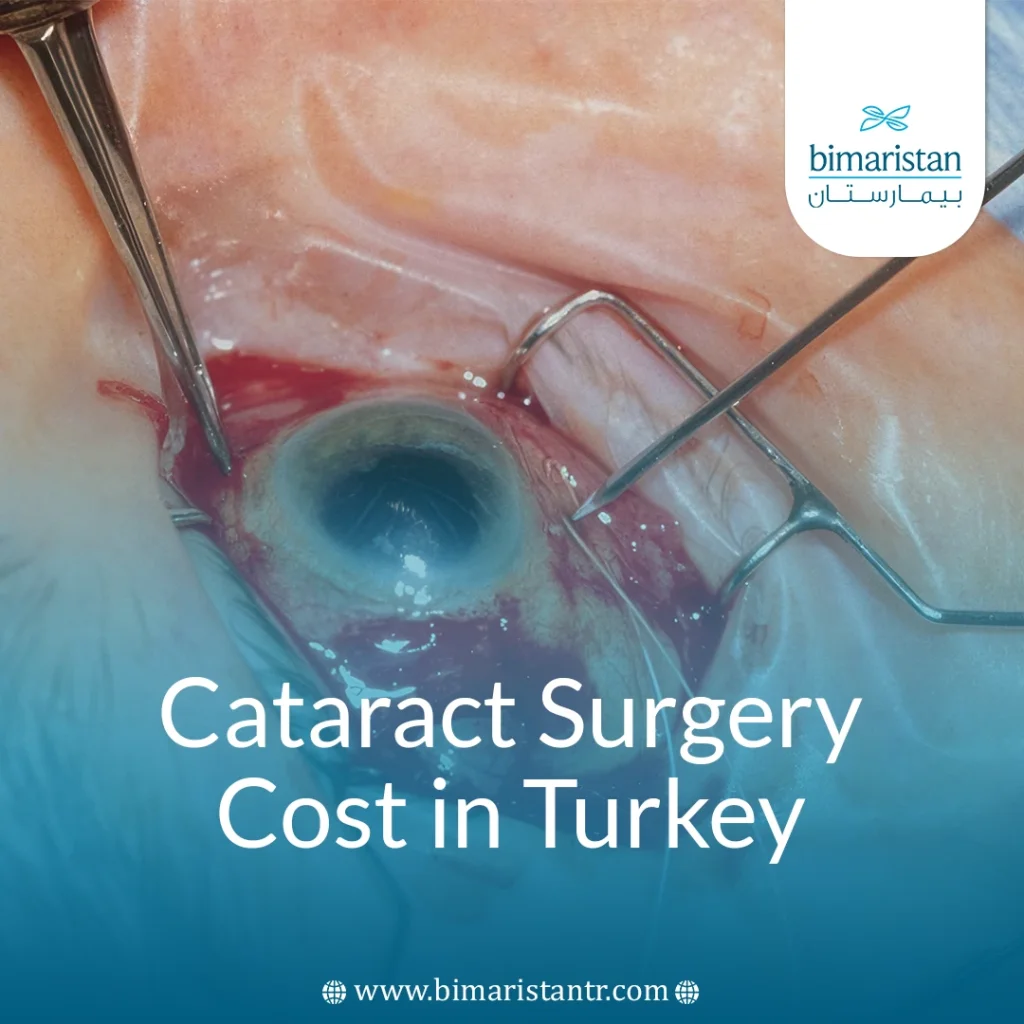Cataract surgery is one of the most common operations in the world, and with the development of medical technology, Turkey has become a favorite destination for patients wishing to undergo this type of operation. The cataract surgery cost in Turkey is appropriate and low compared to European, Gulf, and US countries, without compromising on medical quality or surgical expertise.
What is cataract surgery?
Cataracts are a condition that affects more women than men, as the lens of the eye becomes opaque and cloudy, resulting in blurry vision and impaired night vision. Cataracts are common with age, and there are some factors that contribute to the condition, such as:
Smoking, sun exposure, diabetes, eye trauma, and certain medications such as steroids increase the risk of cataracts.
Symptoms of cataracts include:
- Blurry or unclear vision.
- Difficulty with night vision.
- Poor contrast.
- Need stronger lighting for reading.
- Frequent change in eyeglass prescription.

Cataract treatment in its advanced stages is a minimally invasive procedure, in which the doctor removes the cataract-affected lens and implants a clear artificial lens in its place, which helps improve vision. This is one of the most common, safe, and popular procedures in ophthalmology.
Average cataract surgery cost in Turkey
The average cataract surgery cost in Turkey for one eye ranges from 1,200 to 1,500 US dollars, and what distinguishes Turkey is its ability to provide this service with high quality and at much lower prices than most European and North American countries, without compromising efficiency or medical safety.
Comparing the cataract surgery cost in Turkey and other countries
The cost varies significantly from country to country. In this table, we show the differences in prices between countries:
| State | Average cost per eye |
|---|---|
| Turkey | 800 – $2,000 |
| United States | 3,000 – 5,000 dollars |
| Germany | 2,500 – 4,000 dollars |
| The bay | 2,000 – $3,500 |
What factors affect the cataract surgery cost in Turkey?
- Type of lens implant: The cost varies depending on the type of lens implant
- Monofocal lens: This is the cheapest, and allows for a clear view of only one distance (near or far).
- Multifocal lens: More expensive and can help eliminate the need for glasses.
- Lenses that correct astigmatism (Toric): Specialized for certain conditions and increase the cost.
- The technology used in the process: The cost varies depending on the technology usedPolylang
- Phacoemulsification: More common and less expensive.
- Femto-laser: More precise and newer, but costs 20-30% more.
- The experience of the surgeon: Doctors with long experience and a high reputation charge more, which is reflected in the overall price.
- The patient’s health status: If there are complications such as glaucoma or retinal disease, the procedure may require additional techniques that increase the cost.
- Hospital or medical center: Prices vary between large private hospitals and small medical centers, with large hospitals providing advanced medical services and modern technologies under the supervision of specialized surgeons.
Comparison of cataract surgery prices in Turkey according to the type of lens and the technique used
| Lens Type/Technology | Average cost in dollars |
|---|---|
| Monofocal lens + conventional surgery (phaco) | 800 – $1,000 |
| Monofocal Lens + Femto Laser | $1,200 – $1,500 |
| Multifocal lens + conventional surgery | $1,400 – $1,700 |
| Multifocal Lens + Femto Laser | $1,800 – $2,000 |
| Lens for correcting astigmatism (toric) + Vacuo | $1,500 – $1,800 |
| Toric Lens + Femto Laser | $1,800 – $2,200 |
Why is Turkey a favorite choice for cataract surgery?
- Favorable cost competitiveness: Turkey offers high-quality medical services at much lower prices compared to European or American countries without sacrificing quality.
- Expertise and competence of doctors: The ophthalmology specialty in Turkey includes specialized doctors with extensive experience in performing cataract surgery, often with international training and accredited certifications from international medical centers.
- Utilizing the latest medical technologies: Turkish hospitals rely on modern technologies such as femto-laser and faco surgery, which ensure greater accuracy, higher safety, and a faster recovery period for the patient.
- High success rate: Millions of cataract surgeries are performed annually in Turkey with success rates of more than 95%.
- Accessibility and services for medical tourists: Turkey provides comprehensive services for medical tourists, including translation assistance, transportation, accommodation, and medical consultations, making the treatment experience comfortable and hassle-free.
How to choose the best hospital for cataract surgery in Turkey
When performing cataract surgery in Turkey, choosing the right hospital is an essential step to ensure the success of the operation and obtain the best results. It is important to verify the experience and competence of doctors working in the hospital, and that they have long experience and great successes in cataract operations, and their use of the latest technologies such as femto-laser and phaco technology, which contributes to improving the accuracy of the operation and reducing the recovery period.
The hospital must clarify the prices, and it is best to choose a hospital that offers a comprehensive price that covers all expenses and additional services such as transportation, accommodation and translation. So the ideal hospital is one that combines experience, modern technology, transparency, and integrated service for patients from inside and outside Turkey.
In conclusion, choosing Turkey for cataract surgery is a smart choice that combines medical quality and affordability. Thanks to the expertise of the doctors and the hospitals’ use of the latest technology, patients can get excellent results at a much lower cost than in other countries. If you are considering restoring clarity to your vision, the cataract surgery cost in Turkey makes it a safe and affordable treatment, with comprehensive services that ensure your comfort and peace of mind throughout your treatment journey.
Sources:
- National Eye Institute. (n.d.). Cataract surgery. National Institutes of Health. Retrieved June 26, 2025, from
- MedlinePlus. (n.d.). Cataracts. U.S. National Library of Medicine. Retrieved June 26, 2025, from
